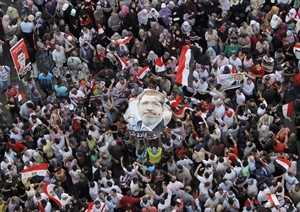
Egyptians carry a poster showing newly-elect President Mohammed Morsi, in Tahrir Square, Cairo, Egypt, Sunday, June 24, 2012. Mohammed Morsi was declared Egypt's first Islamist president on Sunday after the freest elections in the country's history, narrowly defeating Hosni Mubarak's last Prime Minister Ahmed Shafiq in a race that raised political tensions in Egypt to a fever pitch. (AP Photo/Amr Nabil)
June 26, 2012 - 5:38 PM
OTTAWA - The Harper government is calling on Egypt's new Islamist president-elect to live up to his country's peace treaty with Israel.
Mohammed Morsi, a former member of the once-banned fundamentalist Muslim Brotherhood, became the first Islamist president of Egypt on Sunday, igniting speculation about whether that would lead to any change in Egypt's 1979 peace treaty with Israel.
His narrow victory over Ahmed Shafiq, the former prime minister of ousted president Hosni Mubarak minister, has also left Egypt deeply divided.
"The presidential elections mark an important milestone in the transition to democratic government in Egypt," Rick Roth, the spokesman for Foreign Affairs Minister John Baird, told The Canadian Press in an emailed response to questions.
"Canada expects Egypt to live up to its international commitments, in particular its treaty with Israel."
Morsi told a television audience during his victory address that he would preserve Egypt's international accords, an apparent reference to the peace deal with Israel.
A veteran Middle East analyst cautions against some of the "apocalyptic scare mongering" about Morsi's intentions that have garnered widespread speculation. That includes speculation that Morsi will push Egypt closer to relations with Iran, which is Israel's sworn enemy.
"Certainly the core peace agreement will stay. There's no doubt about that in anybody's mind. There may be some requests to negotiate some specific articles," said Rami Khouri, director of the American University of Beirut's international affairs institute.
Khouri said all new governments exercise their prerogative to make changes to their country's foreign policy.
"The current Canadian government became much more pro-Israeli than previous Canadian governments, which were much more impartial between Palestinians and Israelis," said Khouri.
"Let's assess the Egyptian president the same way we assess the Canadian and American governments. On that basis, I think you'd have to say it's normal to expect some shifts in policy, but the core issue … I don't see any real change."
Baird has said in the past that he's willing to see how post-Arab Spring events unfold before passing judgment.
As it became apparent that last year's Arab Spring uprisings were also giving rise to Islamist political movements in North Africa and the Middle East, Baird said in December: "We'll judge them by the actions they take, not the reputations they bring."
Baird issued a statement Sunday wishing Morsi well on his victory, but urging further democratic reform.
"Egypt must remain on a path toward freedom, democracy, human rights and the rule of law, and work to protect the rights of women and religious minorities, including Egypt's significant Coptic community," Baird's statement said.
Baird has made the protection of religious minorities, such as Egypt's Copts, a focus of Canadian foreign policy. He has yet to formally install the Office of Religious Freedom in Foreign Affairs that the Conservatives promised in their election platform 14 months ago.
Morsi offered Egyptians a pledge of unity in his acceptance speech, promising to protect the rights of all religions as well as women.
Morsi's other major challenge is a power struggle with Egypt's military rulers, a group to whom he extended an olive branch in his speech on Sunday.
The Supreme Council of the Armed Forces has run the country since Mubarak was driven from power last year. It has promised to turn over power to the new president by the end of the month, but there are widespread doubts whether Egypt's generals will truly loosen their grip on power.
The military will continue to be a powerful force in Egypt and that will ensure that status quo is maintained with Israel, said Errol Mendes, a University of Ottawa law professor who specializes in international issues.
"In the short run, I don't think there's much to be worried about, especially because the military's in charge," said Mendes.
News from © The Canadian Press, 2012